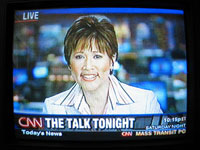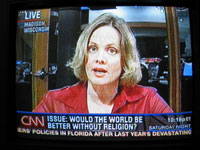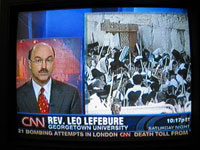Below is a transcript of CNN Saturday, on CNN TV, The Talk Tonight” segment, July 30, 2005, with host Carol Lin. Her guests were Annie Laurie Gaylor, co-president, Freedom From Religion Foundation, and Rev. Leo Lefebure, Georgetown University.
The refreshing topic: Would the world be a better place without religion?

CNN host Carol Lin
Foundation co-president Annie Laurie Gaylor
Priest Lee Lefebure
|
Carol Lin: Well, this is our “Talk Tonight.” We invite you also to join the discussion. It is a deep and profound one.
Global division, history’s deadliest wars, terrorism, fiery hatred, and untold millions killed–all under the umbrella of religious discord. Christians, Muslims, Hindus, Jews, Orthodox Buddhists, Shintus, Tamils . . . on and on since the dawn of civilization.
Our “Talk Tonight” question: Would the world be a better place, a safer place, a happier place without religion?
My guests tonight: Annie Laurie Gaylor, a feminist author and co-founder of the Freedom From Religion Foundation. She’s in Madison, Wisconsin.
And Father Leo Lefebure, priest, author, and professor of theology at Georgetown University.
Welcome to both of you.
Ms. Gaylor, let me begin with you. Is religion what makes people want to murder one another?
Gaylor: It certainly is true that more people have been killed in the name of religion, or in the name of God, than for any other reason. It’s sort of the ultimate excuse to kill. To say that there’s a god in the sky who’s telling me that you’re an infidel and I should kill you is certainly the strongest argument that could be made. Without that kind of supernatural rationale, the world would be much safer.
Lin: Father Lefebure, is there something inherent in religion that makes people violent?
Lefebure: Religion channels the deepest devotions and commitments of people, and so it can both call forth the best in us, but when it absolutizes something in this world, it can become tremendously demonic. So there is a profound danger there.
Lin: So you would agree with Ms. Gaylor, then, that religion is almost the root of all evil when it comes to war and violence on this planet?
Lefebure: Absolutely not. We’ve seen what organized atheistic movements have done in the 20th century when they sought to eradicate religion under Stalin, Mao Tse Tung, Pol Pot. We had tens of millions killed, on a scale far greater than any religious conflicts prior to that in history.
Lin: Ms. Gaylor?
Gaylor: I would like to see the headlines someday, “Atheists Fighting Agnostics” and “Atheists Starting War.” More people have been killed in the name of religion. When you talk about someone like Stalin, for example, he was seminary educated, and he was not killing in the name of atheism . . .
Lefebure: Oh yes he was . . .
Gaylor: . . . it was totalitarian, and he was using the template of religion–religious totalitarianism. The freethought movement’s motto is “No gods, no masters.” So we would repudiate that idea of a master/slave relationship which you find in the bible and in the New Testament, and that is what has created the scorched-earth policies that we see all over the world. Most conflagrations are religious today . . .
Lin: Well, wait . . . Father Lefebure, I want to give you a chance to respond . . . but Ms. Gaylor, what sort of a world do you imagine without religion, then?
Gaylor: Well, to paraphrase John Lennon: Imagine no religion. “No hell below us, above us only sky.” We would be that much closer to creating a paradise on earth if we could get rid of the baggage of superstition and religion. And instead of investing all of our energies–misdirecting them–to religion and to an unknown god, a god that does not exist, we would be putting our energies into this world, and making the world a better place instead of waiting for pie in the sky.
Lin: Okay. Let’s hear from Father Lefebure.
Lefebure: Religion can go both ways. Nelson Mandela was very clear that the struggle against apartheid in South Africa would never have taken place as peacefully as it did without the cooperation of religious leaders from different traditions. Repeated studies in mental health and psychology in the United States over more than 30 years have shown that people with religious faith have a far lower rate of suicide, of depression, of divorce, and of abuse of alcohol and drugs, and so there is a very strong correlation between a strong religious faith and practice and mental health.
Lin: Ms. Gaylor?
Gaylor: Our prisons are full of Christians and believers. There are statistically disproportionately less atheists in prison than we are in the population. Nonbelievers are 14 percent of the population. We would not have had apartheid, we would not have had the slavery of the 19th century, for example, were it not for religion–were it not for the fact that the bible sanctified slavery, and the slave holders used the bible to enslave.
Lin: All right. Father Lefebure, I want to give you the last word here. Imagine a world without religion, without faith. What is your picture?
Lefebure: I find it very difficult to imagine. Even the greatest writers who have been nonbelievers, like Marcel Proust or James Joyce, have been immersed in religious imagery, and have used it very creatively to discuss the meaning of human life.
Lin: Father Lefebure, thank you very much. Annie Laurie Gaylor, thank you very much. Both of you make excellent points.



